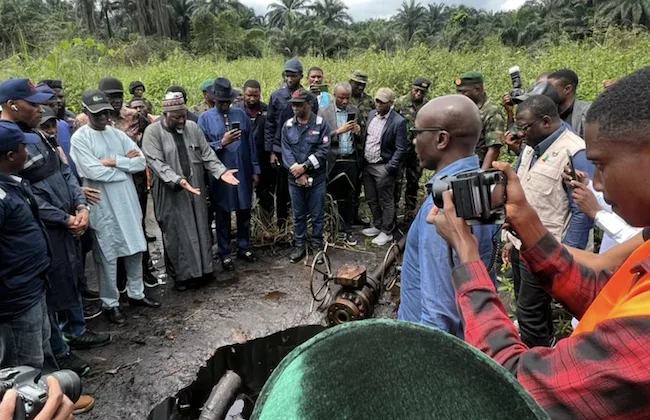In a deeply concerning incident that has cast a shadow over the integrity of the Yobe State Police, Commissioner of Police Garba Ahmed has mandated a thorough investigation into a homicide case involving Inspector Mohammed Bulama, a member of the Police Mobile Force, 41 Division, located in Damaturu. This incident not only raises alarm bells regarding police conduct but also sparks essential conversations about accountability within the force.
Incident Overview
The sequence of events leading to this tragic situation began on September 29, 2024, at approximately 6:20 PM. According to a detailed press release issued by the Police Public Relations Officer for the Yobe Police Command, DSP Dungus Abdulkarim, the confrontation erupted between Inspector Bulama, 38, and Abdulmalik Dauda, a 39-year-old resident of Pompomari Ward, Damaturu. The two men engaged in a heated argument over an unresolved transaction in the bustling Zango Area of Damaturu.
What initially seemed to be a verbal disagreement rapidly escalated into a violent altercation. During the confrontation, Inspector Bulama allegedly used a knife, inflicting a stab wound to Dauda’s chest. The severity of the injuries sustained by Dauda not only shocked the local community but also highlighted the urgent need for addressing the behavioral standards expected of law enforcement officers. Witnesses to the altercation reported seeing a chaotic scene unfold, with bystanders expressing disbelief that a police officer would resort to such extreme measures.
Immediate Actions Taken
In the wake of the altercation, Inspector Bulama sought refuge at the ‘C’ Divisional Police Headquarters, where he was promptly apprehended. This action underscores the complexity of the situation, as it raises questions about the immediate response of law enforcement personnel during internal conflicts. The State Criminal Investigation Department has taken the lead on this case, initiating an investigation focused on the specifics of the incident, including how it escalated and the circumstances surrounding Bulama’s actions.
As the investigation progresses, Inspector Bulama remains in custody, awaiting both internal disciplinary actions from the police department and potential criminal prosecution. The nature of the charges that may be brought against him could have significant implications, not only for his career but also for the broader public perception of police accountability.
Official Responses and Community Concerns
Commissioner Ahmed’s response to the incident has been firm and unequivocal. He condemned the actions of Inspector Bulama and expressed his heartfelt condolences to the family of Abdulmalik Dauda. In a statement aimed at restoring public confidence, Ahmed emphasized that the Nigeria Police Force will not tolerate any misconduct from its personnel, stating, “We will ensure that justice is served and the perpetrator is held accountable.” This commitment to accountability is crucial, particularly in a society where trust in law enforcement is paramount.
Community members in Damaturu have expressed a mix of shock and anger over the incident. Many have called for increased oversight and reform within the police force, highlighting the need for better training in conflict resolution and mental health support for officers. Local residents are concerned that incidents like this contribute to a growing narrative of police brutality and misconduct, which can erode public trust and safety.
Broader Implications for Police Accountability
The gravity of this incident extends beyond the immediate circumstances of the altercation; it speaks to larger issues within law enforcement in Nigeria. The case has ignited discussions regarding the standards of conduct expected from police officers, especially those in high-stress environments. It raises essential questions about how police personnel are trained to handle conflicts and the resources available to support their mental well-being.
In light of this incident, advocates for police reform have reiterated the importance of establishing robust protocols for de-escalation techniques, crisis intervention, and psychological evaluation. Ensuring that officers are equipped to manage conflict without resorting to violence is crucial for maintaining public safety and trust.
Conclusion: A Call for Reflection and Reform
As the investigation into the tragic death of Abdulmalik Dauda unfolds, the Yobe State Police face a pivotal moment in their commitment to transparency and integrity. The outcome will resonate beyond the individuals involved, potentially impacting public perceptions of law enforcement throughout Nigeria.
For the community, the hope is that this incident serves as a catalyst for meaningful change within the police force. By fostering an environment of accountability and prioritizing the well-being of both officers and the public, the Nigeria Police Force can begin to restore trust and reaffirm its role as a protector of citizens rather than a source of fear.
The eyes of the public will be keenly focused on how this case is handled, as it represents not just a moment of crisis but an opportunity for growth and transformation within the police force. Only through dedicated efforts toward reform and engagement can the Nigeria Police ensure that such tragedies do not repeat themselves, ultimately serving the communities they are sworn to protect.




